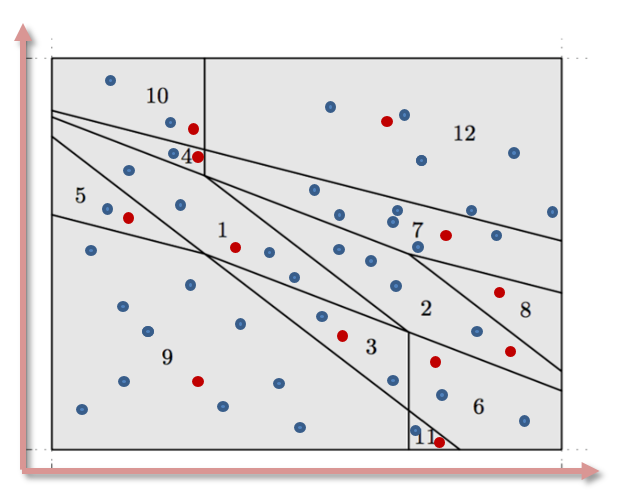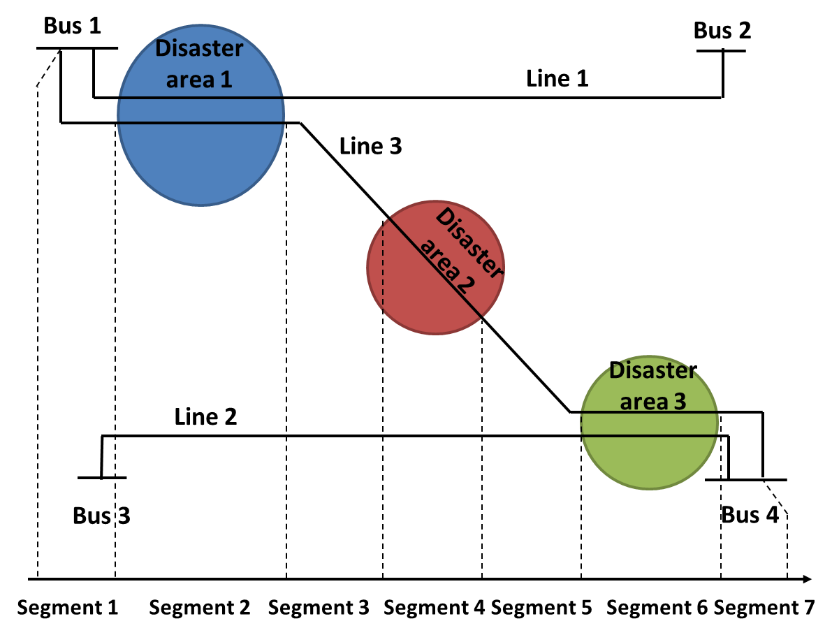Power System Planning & Operation
In this classic research field, we conduct our research in two aspects: 1) We address the newly emerged issues in power system planning and operation using advanced optimization methodology or business model. Especially, we focus on the planning and operation issues brought by new participators are integrated into the power system such as high penetrated renewable energy (RE), electrical vehicles, demand response. Advanced algorithms are proposed to address the uncertainty issues in the stochastic generation and transmission planning and unit commitment. Furthermore, the concept of cloud energy storage is proposed as a solution for storage sharing among different consumers. 2) We develop practical methods in power system planning and operation that is capable of being used real-life power systems. We have developed software kits of power system operation simulation and power system risk assessment. The tools have been used in more than ten provincial and regional power systems in China. We have also conducted some interesting research using these tools.
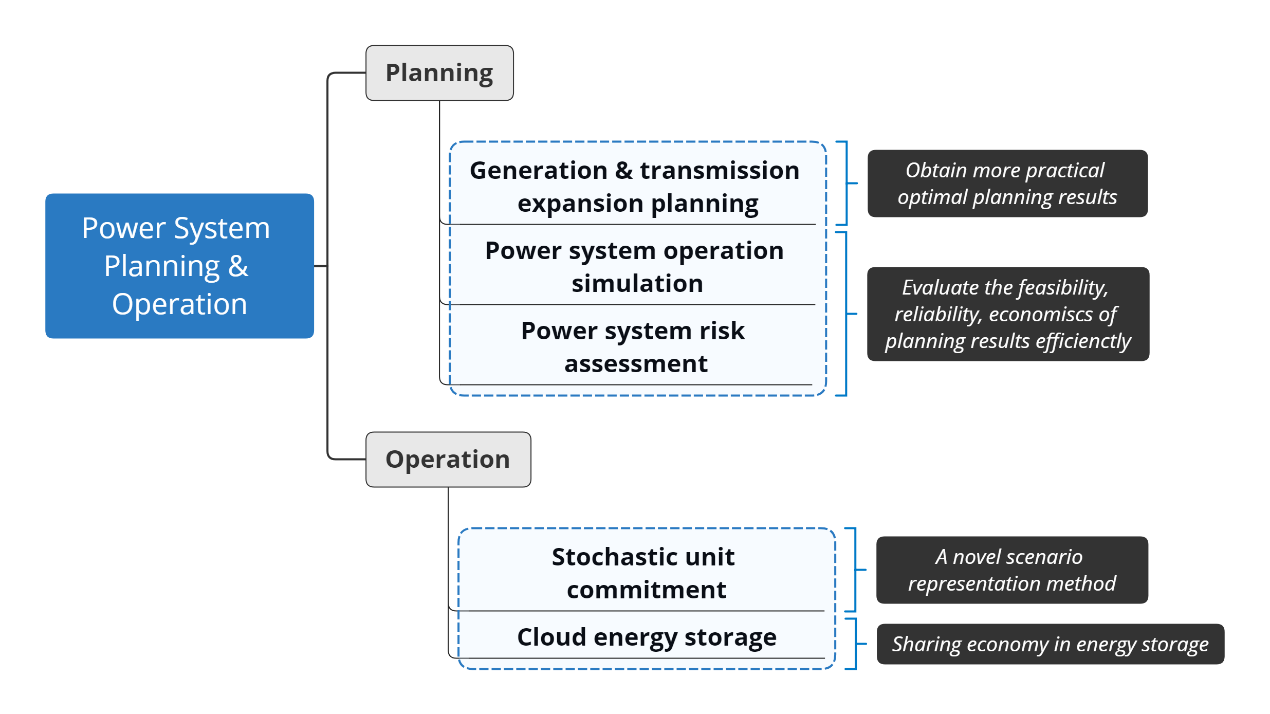 |
Generation & transmission expansion planning model and algorithms
To incorporate operational flexibility in power system planning studies, a high-efficiency and simplified network-constrained unit commitment model for system planning is studied. To tackle the calculation difficulties in the stochastic planning model, we propose an effective algorithm based on Benders decomposition and multi parametric linear planning so that massive RE scenario could be considered.
Power system operation simulation
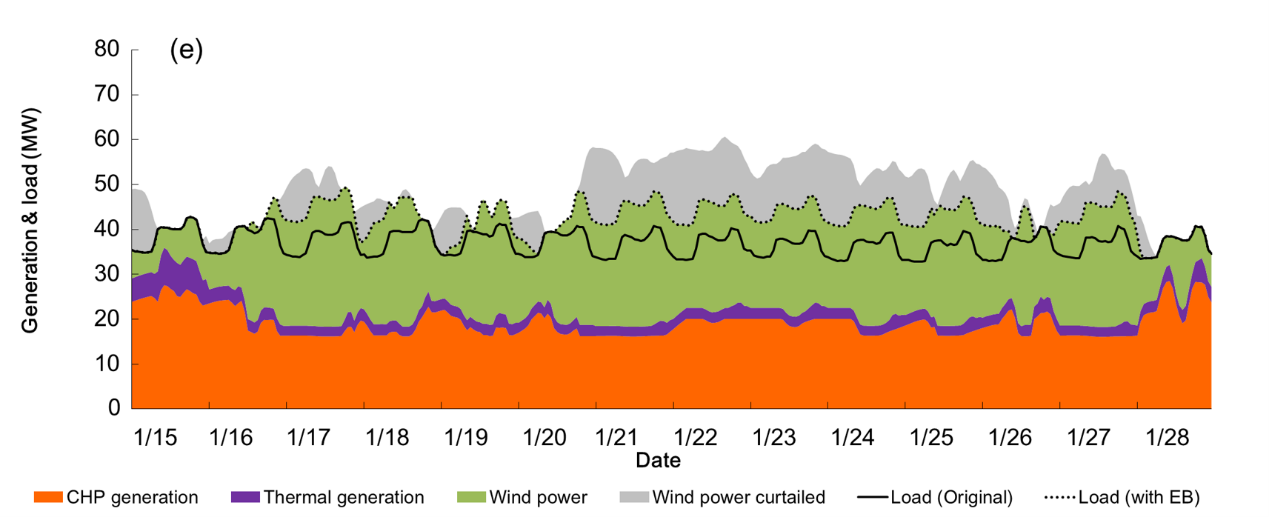 |
Power system operation simulation is a basic tool for evaluating the performance of power system planning scheme. We have developed a software package named “GOPT”, a platform integrating related research achievement in our lab. This software package was designed to simulate chronologically the operation of a power system on a daily basis with a resolution of one hour. It thus makes possible a fine-grained assessment of the feasibility, reliability, and economics of generation and transmission expansion planning. Several case studies on real situation in China have been done to show the effectiveness and provided practical advices such as the impacts on RE curtailment by employing electrical boiler.
Power system risk assessment
To accelerate the calculation of reliability evaluation, we propose a multi-parametric linear planning based fast power system reliability evaluation using transmission line status dictionary. Our proposed method improves the efficiency for 30 times on IEEE Reliability Test Systems and a provincial power system in China.
Stochastic unit commitment
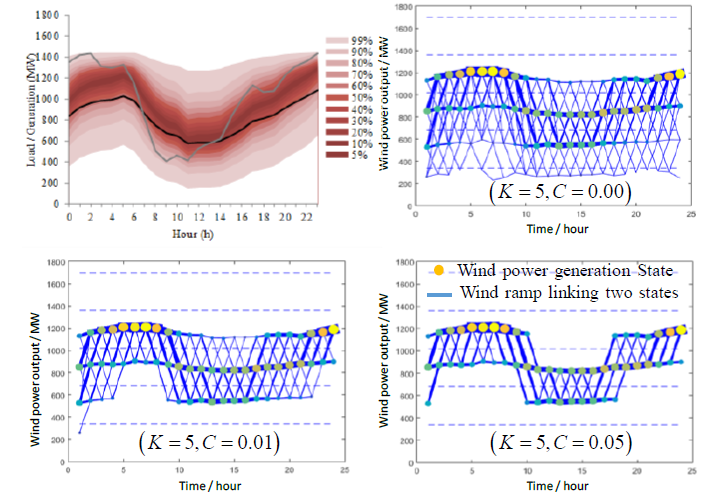 |
Stochastic optimization methods are introduced in power system operations to strategically schedule the flexible resources to accommodate the uncertainty and variability of the renewable power generation. Among the massive research in stochastic unit commitment (SUC), we propose a novel scenario representation method referred to as scenario mapping technology (SMT), which is able to compact large amount of scenarios while preserving the uncertainty and variability features of wind power. The method is able to present large amount of scenarios while keeping the SUC tractable. We also propose a risk-based unit commitment model that can identify the underlying risks of the scheduling imposed by renewable energy uncertainty while keeping the SUC model as compact as the deterministic unit commitment model, including loss of load, wind curtailment and branch overflow.
Cloud energy storage
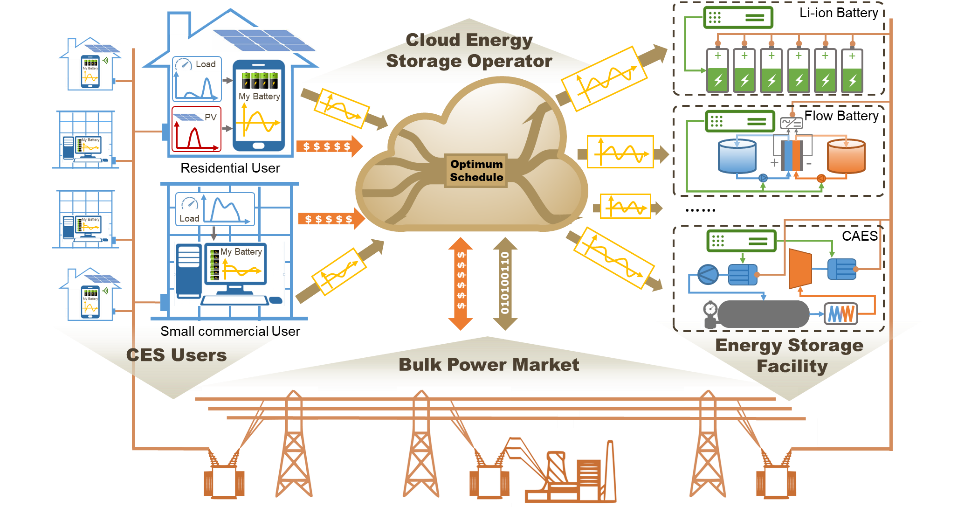 |
We develop a novel way of using energy storage - cloud energy storage - a grid-based storage service that enables ubiquitous and on-demand access to a shared pool of grid-scale energy storage resources. We firstly propose the concept of cloud energy storage which utilized central energy storage facilities to provide distributed storage services to residential and small commercial users. We then develop the architecture, enabling technologies and operation mechanisms that would facilitate the cloud energy storage. We also design the business model of cloud energy storage and demonstrated its profitability using real-life residential load and electricity data.
Security and stability rule in power system operation optimization
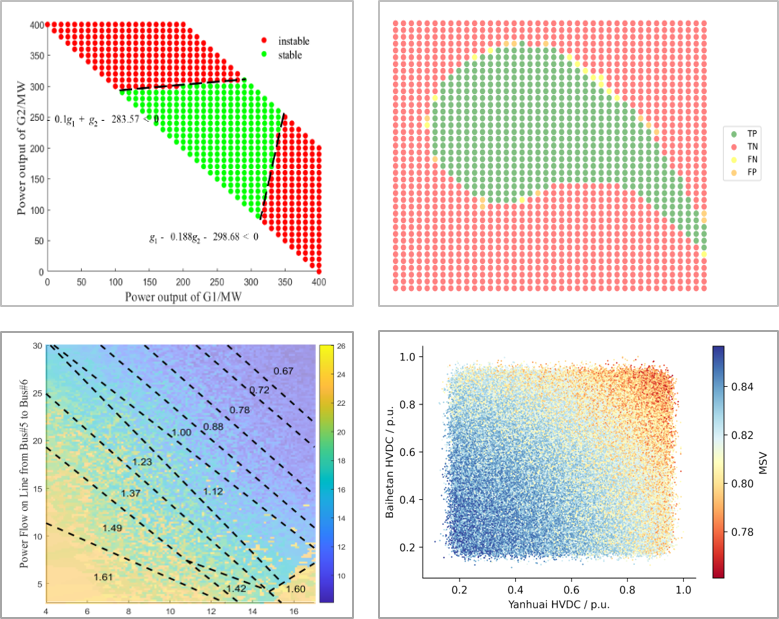 |
We proposed the method to embed security and stability rules in power system operation and optimization. Power system operation should properly consider the security and stability issues brought by the large variation of renewable energy output and high penetration of power electronics. However, high renewable energy penetration complicates the security and stability rules. The rules are often too complex to embed in power system operation optimization because of their non-linearity and non-convexity. To solve this problem, we proposed a framework to use data-driven models to act as the embeddable proxy of power system security and stability constraints in power system optimization. The advantage of such a methodology framework is twofold. On the one hand, it is highly flexible in terms of the types of security and stability problems, the data-driven model chosen, and the way of embedding the rule into power system operation optimization. On the other hand, it does not affect the mathematical form of traditional power system optimization models, e.g., security constrained unit commitment, economic dispatch, optimal power flow models, or even market-based models. Therefore, such data-driven methods can smoothly integrate into the current power system operation framework without overthrowing any current models.We proposed the method to embed security and stability rules in power system operation and optimization. Power system operation should properly consider the security and stability issues brought by the large variation of renewable energy output and high penetration of power electronics. However, high renewable energy penetration complicates the security and stability rules. The rules are often too complex to embed in power system operation optimization because of their non-linearity and non-convexity. To solve this problem, we proposed a framework to use data-driven models to act as the embeddable proxy of power system security and stability constraints in power system optimization. The advantage of such a methodology framework is twofold. On the one hand, it is highly flexible in terms of the types of security and stability problems, the data-driven model chosen, and the way of embedding the rule into power system operation optimization. On the other hand, it does not affect the mathematical form of traditional power system optimization models, e.g., security constrained unit commitment, economic dispatch, optimal power flow models, or even market-based models. Therefore, such data-driven methods can smoothly integrate into the current power system operation framework without overthrowing any current models.
Related Publications:
Hongyang Jia, Qingchun Hou, Pei Yong, Yuxiao Liu, Ning Zhang, Dong Liu and Mengxi Hou. Voltage stability constrained operation optimization: an ensemble oblique regression tree method. IEEE Transactions on Power Systems, 2023. “Link”
Jiawei Zhang, Zhichao Chen, Ning Zhang, Xianfeng Zhang. Frequency-constrained unit commitments with linear rules extracted from simulation results considering regulations from battery storage, Journal of Modern Power Systems and Clean Energy, accepted, in press, 2023
Jiawei Zhang, Hongyang Jia, Ning Zhang. Alternate support vector machine decision trees for power systems rule extractions. IEEE Transactions on Power Systems. 2023, 38(1): 980-983. “Link”
Jiawei Zhang, Ning Zhang and Yi Ge, Energy storage placements for renewable energy fluctuations: a practical study. IEEE Transactions on Power Systems. 2023. doi: 10.1109/TPWRS.2022.3214983. “Link”
Kangping Li, Yuxi Wang, Ning Zhang, Fei Wang. Precision and accuracy co-optimization based demand response baseline load estimation using bi-directional data. IEEE Transactions on Smart Grid, 2023,14(1): 266-276. “Link”
Kangping Li, Yuqing Wang, Ning Zhang, Fei Wang, Chunyi Huang. Spatio-temporal granularity co-optimization based monthly electricity consumption forecasting. CSEE Journal of Power and Energy Systems, Early Access, 2023. “Link”
Ning Zhang, Hongyang Jia, Qingchun Hou, Ziyang Zhang, Tian Xia, Xiao Cai, Jiaxin Wang, “Data-Driven Security and Stability Rule in High Renewable Penetrated Power System Operation,” in Proceedings of the IEEE, 2022, doi: 10.1109/JPROC.2022.3192719. “Link”
Zhenyu Zhuo, Ershun Du, Ning Zhang, Chris P. Nielsen, Xi Lu, Jinyu Xiao, Jiawei Wu and Chongqing Kang*. Cost increase in the electricity supply to achieve carbon neutrality in China. Nature Communication. 13, 3172 (2022). “Link”
Ning Zhang, Haiyang Jiang, Ershun Du*, Zhenyu Zhuo, Peng Wang, Zhidong Wang, Yan Zhang. An Efficient Power System Planning Model Considering Year-round Hourly Operation Simulation. IEEE Transactions on Power Systems, 2022, 37(6): 4925-4935. “Link”
Zhenyu Zhuo, Ning Zhang, Qingchun Hou, Ershun Du and Chongqing Kang, Backcasting technical and policy targets for constructing low-carbon power systems. IEEE Transactions on Power Systems, 2022, 37(6): 4896-4911. “Link”
Pei Yong, Ning Zhang, Yuxiao Liu, Qingchun Hou, Yaowang Li and Chongqing Kang*, Exploring the Cellular Base Station Dispatch Potential Towards Power System Frequency Regulation, IEEE Transactions on Power Systems, 2022, 37(1): 820-823. “Link”
Jiawei Zhang, Peng Wang and Ning Zhang. Frequency regulation from distributed energy resource using cloud-edge collaborations under wireless environments. IEEE Transactions on Power Systems, 2022, 69(3), 720-728. “Link”
Hongjie He, Ershun Du, Ning Zhang, Xuebin Wang, Chongqing Kang. Enhancing the Power Grid Flexibility with Battery Energy Storage Transportation and Transmission Switching. Applied Energy. 2021, 290: 116692. “Link”
Ning Zhang, Haiyang Jiang, Yaowang Li, Pei Yong, Mingxuan Li, Huan Zhu, Song Ci, Chongqing Kang. Aggregating Distributed Energy Storage: Cloud-Based Flexibility Services From China, IEEE Power and Energy Magazine, 2021, 19(4), 63-73. “Link”
Qingchun Hou, Ning Zhang, Daniel S. Kirschen, Ershun Du, Yaohua Cheng and Chongqing Kang, Sparse Oblique Decision Tree for Power System Security Rules Extraction and Embedding, IEEE Transactions on Power Systems, 2021,36(2): 1605-1615. “Link”
Peng Wang, Ershun Du, Ning Zhang, Xinzhi Xu, Yi Gao. Power system planning with high renewable energy penetration considering demand response J. Global Energy Interconnection, 2021, 4(1):69-80. “Link”
Qingchun Hou, Yanghao Yu, Ershun Du, Hongjie He, Ning Zhang, Chongqing Kang, Guojing Liu, Huan Zhu, Embedding Scrapping Criterion and Degradation Model in Optimal Operation of Peak-shaving Lithium-ion Battery Energy Storage, Applied Energy, 2020, 278: 115601. “Link”
Ziyang Zhang, Ershun Du, Fei Teng, Ning Zhang, Chongqing Kang. Modeling Frequency Dynamics in Unit Commitment with a High Share of Renewable Energy. IEEE Transactions on Power Systems. 2020,35(6): 4383-4395. “Link”
Ziyang Zhang, Ershun Du, Guiping Zhu, Ning Zhang, Chongqing Kang, Huimin Qian, João P. S. Catalão. Modeling Frequency Response Dynamics in Power System Scheduling. Electric Power Systems Research, 2020, 189: 106549. “LInk”
Zhenyu Zhuo, Ning Zhang, Jingwei Yang, Chongqing Kang*, Charlie Smith, Mark J. O’Malley, and Benjamin Kroposki. Transmission Expansion Planning Test System for ACDC Hybrid Grid with High Variable Renewable Energy Penetration. IEEE Transactions on Power Systems/, 2020, 35(4):2597-2608. “Link”
Jingwei Yang, Audun Botterud, Ning Zhang, Yunqiang Lu, Chongqing Kang. A Cost-Sharing Approach for Decentralized Electricity-Heat Operation with Renewables. IEEE Transactions on Sustainable Energy, 2020,11(2): 1679- 1690. “Link”
Zhenyu Zhuo, Ershun Du, Ning Zhang, Chongqing Kang, Qing Xia and Zhidong Wang, Incorporating Massive Scenarios in Transmission Expansion Planning with High Renewable Energy Penetration. IEEE Transactions on Power Systems,vol. 35, no. 2, pp. 1061-1074, March 2020, doi: 10.1109/TPWRS.2019.2938618, “Link”.
Ershun Du, Ning Zhang, Bri-Mathias Hodge, Qin Wang, Zongxiang Lu, Chongqing Kang, Benjamin Kroposki and Qing Xia. Operation of a High Renewable Penetrated Power System with CSP plants: A Look-ahead Stochastic Unit Commitment Model, IEEE Transactions on Power Systems, 2019, 34(1): 140-151. “Link”
Ershun Du, Ning Zhang, Chongqing Kang and Qing Xia. A High-efficiency Network-constrained Clustered Unit Commitment Model for Power System Planning Studies, IEEE Transactions on Power Systems, 2019, 34(4): 2498-2508. “Link”
Pei Yong, Ning Zhang, Chongqing Kang, Qing Xia and Dan Lu. MPLP Based Fast Power System Reliability Evaluation Using Transmission Line Status Dictionary, IEEE Transactions on Power Systems, 2019, 34(2): 1630-1640. “Link”
Ershun Du, Ning Zhang, Chongqing Kang and Qing Xia. Scenario Map Based Stochastic Unit Commitment, IEEE Transactions on Power Systems, 2018, 33(5): 4694-4705. “Link”
Jingkun Liu, Ning Zhang, Chongqing Kang, Daniel S. Kirschen and Qing Xia. Decision-making models for the participants in cloud energy storage, IEEE Transactions on Smart Grid, 2018, 9(6): 5512-5521. “Link”
Jingkun Liu, Ning Zhang, Chongqing Kang, Daniel Kirschen and Qing Xia. Cloud energy storage for residential and small commercial consumers: A business case study, Applied Energy, 2017, 188: 226-236. “Link”
Antonio J. Conejo, Yaohua Cheng, Ning Zhang and Chongqing Kang. Long-term coordination of transmission and storage to integrate wind power, CSEE Journal of Power and Energy Systems, 2017, 3(1): 36-43. “Link”
Yi Wang, Ning Zhang, Qixin Chen, Jingwei Yang, Chongqing Kang and Junhui Huang. Dependent Discrete Convolution Based Probabilistic Load Flow for the Active Distribution System, IEEE Transactions on Sustainable Energy, 2017, 8(3): 1000-1009. “Link”
Zhifang Yang, Anjan Bose, Haiwang Zhong, Ning Zhang, Qing Xia and Chongqing Kang. Optimal Reactive Power Dispatch with Accurately Modeled Discrete Control Devices: A Successive Linear Approximation Approach, IEEE Transactions on Power Systems, 2017, 32(3): 2435-2444. “Link”
Yanlong Sun, Chongqing Kang, Qing Xia, Qixin Chen, Ning Zhang and Yaohua Cheng. Analysis of transmission expansion planning considering consumption-based carbon emission accounting, Applied Energy, 2017, 193: 232-242. “Link”
Ning Zhang, Xi Lu, Michael B. McElroy, Chris P. Nielsen, Xinyu Chen, Yu Deng and Chongqing Kang. Reducing curtailment of wind electricity in China by employing electric boilers for heat and pumped hydro for energy storage, Applied Energy, 2016, 184: 987-994. “Link”
Qianyao Xu, Chongqing Kang, Ning Zhang, Yi Ding, Qing Xia, Rongfu Sun and Jianfei Xu. A probabilistic method for determining grid-accommodable wind power capacity based on multiscenario system operation simulation, IEEE Transactions on Smart Grid, 2016, 7(1): 400-409. “Link”
Di Wu, Ning Zhang, Chongqing Kang, Yi Ge, Zhenjian Xie and Junhui Huang. Techno-economic analysis of contingency reserve allocation scheme for combined UHV DC and AC receiving-end power system, CSEE Journal of Power and Energy Systems, 2016, 2(2): 62-70. “Link”
Ning Zhang, Chongqing Kang, Qing Xia, Yi Ding, Yuehui Huang, Rongfu Sun, Junhui Huang and Jianhua Bai. A Convex Model of Risk-Based Unit Commitment for Day-Ahead Market Clearing Considering Wind Power Uncertainty, IEEE Transactions on Power Systems, 2015, 30(3): 1582-1592. “Link”
Xiaoming Dong, Chongqing Kang, Hua Sun and Ning Zhang. Analysis of power transfer limit considering thermal balance of overhead conductor, IET Generation, Transmission and Distribution, 2015, 9(14): 2007-2013. “Link”
Ning Zhang, Chongqing Kang, Daniel S. Kirschen, Qing Xia, Weimin Xi, Junhui Huang and Qian Zhang. Planning pumped storage capacity for wind power integration, IEEE Transactions on Sustainable Energy, 2013, 4(2): 393-401. “Link”
Ning Zhang, Chongqing Kang, Jingkun Liu, Jianbo Xin, Junbiao Wan, Jing Hu and Wenxiao Wei. Mid-short-term risk assessment of power systems considering impact of external environment, Journal of Modern Power Systems and Clean Energy, 2013, 1(2): 118-126. “Link”
